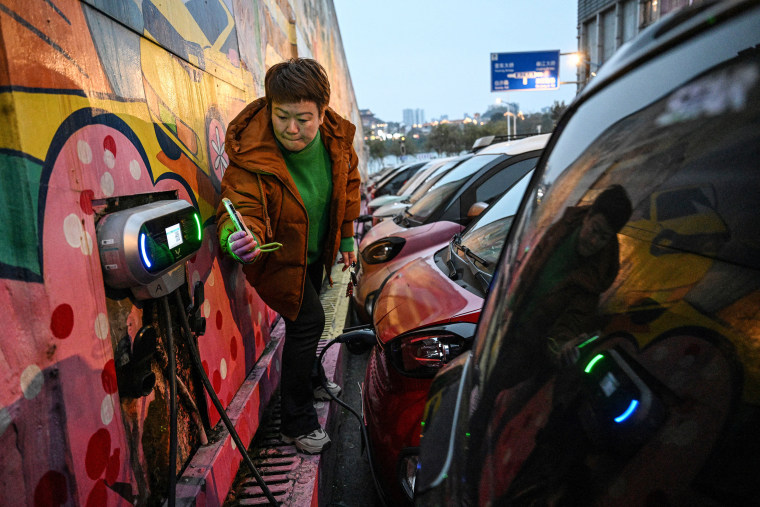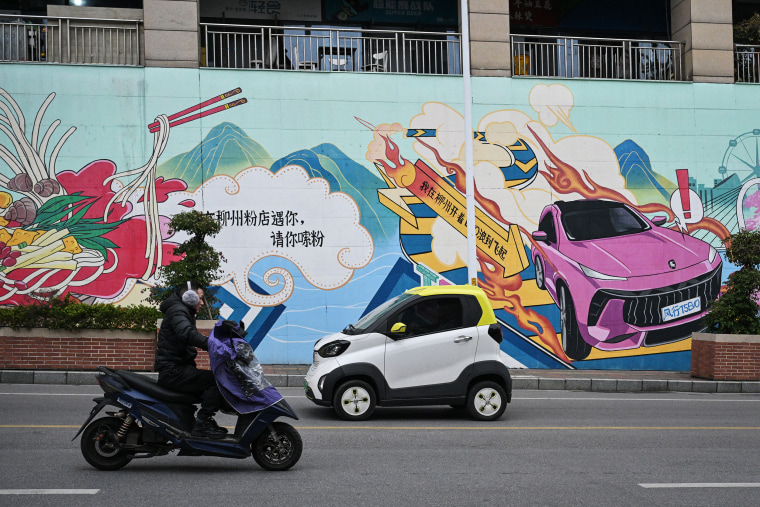Room to grow and eyes on U.S. market in China’s electric vehicle capital
LIUZHOU, China — Liuzhou may be a small city by Chinese standards, but it’s a big player when it comes to the country’s thriving electric vehicle industry.
The city of 4 million, a longtime center of car manufacturing in the southwestern region of Guangxi, brands itself as an EV capital — and for good reason. Last year, it produced half a million EVs of all kinds, with the capacity to make about three times that.
Huge industrial growth aided by the government has raised concerns about Chinese “overcapacity” in EVs and other clean energy products, leading U.S. and other Western officials to impose tariffs meant to make Chinese products less competitive abroad. But Chinese EV makers say they are just playing to their strengths.
“Liuzhou is very competitive as a city for new energy vehicle manufacturing,” said Yu Hongqiao, who manages a factory here for Chinese EV maker Wuling New Energy.
“First, the cost of manpower is very low. Second, the logistics cost is low,” he said in an interview in Liuzhou last month. “Third, the industrial foundation is there. Fourth, there is a lot of talent from the industry here.”
Liuzhou is home to five major state-backed carmakers, including Wuling’s parent company, Guangxi Auto.
One of them, FAW Group, is famous for making the Hongqi, a high-end car used by the government elite. At the other end, SAIC makes a popular $4,000 EV in a joint venture with Guangxi Auto and the American car manufacturer General Motors.
Liuzhou is also filled with other companies that are part of the EV supply chain — about 300 of them — helping to speed production and keep costs down.

The relatively low cost of Chinese EVs has helped them take off in popularity in China, where they are far more common on the roads than in the United States. U.S. EV makers such as Tesla, by contrast, have focused more on luxury models that are out of reach for many consumers.
The price differential, experts say, stems in part from years of Chinese government subsidies and other support.
From 2009 to 2023, that support totaled almost $231 billion, according to a blog post on Thursday by Scott Kennedy, senior adviser and trustee chair in Chinese business and economics at the Center for Strategic and International Studies, a think tank in Washington.
The support, which Kennedy called “a highly conservative estimate,” came mainly in the form of buyer rebates and sales tax exemptions, but it also included research and development, government purchases of EVs and government funding for charging stations and other infrastructure.
Government support and the resulting intense industry competition have helped China’s top EV makers make enormous progress, combining low prices with high quality.
That has raised alarms for officials in the U.S., where Chinese EVs are not yet available.
Citing concerns that Chinese companies could flood the U.S. with goods that undercut American competitors, the Biden administration last month announced plans to raise tariffs on Chinese EVs and other clean energy products, including 100% tariffs on EVs and 25% on EV batteries.
The European Commission followed last week, announcing additional tariffs on Chinese EVs of up to about 38%.

Beijing has criticized the Western tariffs as protectionist, damaging to economic ties and against the global interest in fighting climate change, and there are already signs of retaliation.
The Chinese Commerce Ministry said Monday that it was opening an anti-dumping investigation into European pork products, and Chinese state media reported Wednesday that Chinese automakers had called on Beijing to increase tariffs on gasoline-powered cars imported from Europe.
Though Liuzhou’s production is currently focused almost entirely on domestic consumers, the city is starting to eye overseas markets, including in the U.S.
Yu, whose company set up an overseas department last month, said the U.S. tariffs were out of step with free-market principles.
“Whether it’s a 25% or 100% tariff, it doesn’t impact us manufacturers as much as it hurts American consumers,” he said. “If a consumer needs a product, they will still buy — just at a higher price.”
He also rejected U.S. accusations of Chinese overcapacity in EVs as “groundless.”
“If your cost is low thanks to your scale and your price is more competitive, anyone can compete, right?” he said.





